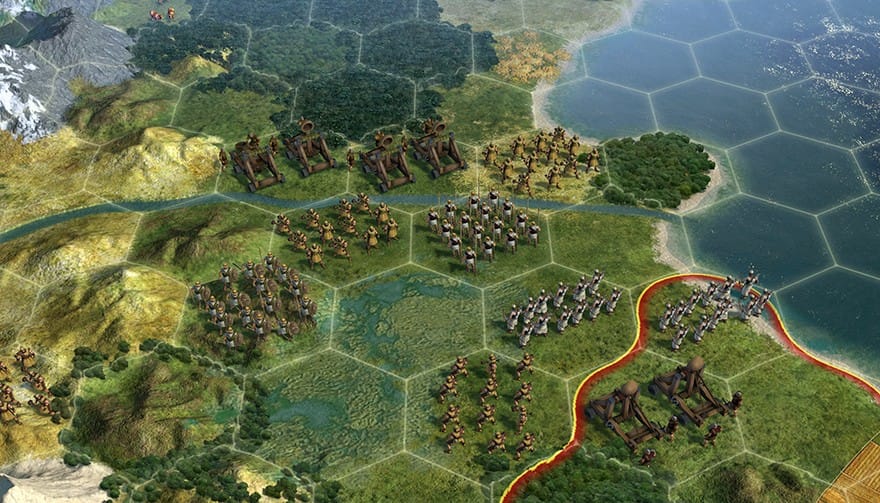What can Civilization V teach us about history?

“The actual past is brittle, ever-dimming + and ever more problematic to access + reconstruct: in contrast, the virtual past is malleable, ever-brightening + ever more difficult to circumvent/expose as fraudulent.” – David Mitchell, Cloud Atlas
By common consensus, Civilization V’s “Fall of Rome” scenario is the most challenging of the twelve historical scenarios bundled with the game’s complete edition. Historical wisdom does the player no good: abandoning Rome’s outer colonies in Spain, Gaul, and North Africa, prioritizing defensive structures, and defending at the few mountain passes of the southern Alps will only prolong an agonizing defeat. Victory, unexpectedly, is most easily achieved by gathering what little forces remain and marching into barbarian lands. If only the Romans had known that their crumbling empire could have been saved had they simply abused the terrible programming of their enemies’ archers.

The “Fall of Rome” scenario vividly illustrates one of the many difficulties of making games that take history as their subject. From this example, one might conclude that had Rome simply gone on the offensive, we might still be speaking Latin. Historically speaking, this is, of course, bullshit. Yet whether or not they intend to, games like Civilization constitute a form of what academics call historiography––the study of the writing of history.
The methods by which history is written––or coded––are inherently ideological. Modeling historical phenomena like cultural diffusion, civic dissent, and the spread of religion, all of which appear in Civilization V, entails making assumptions about the causes and effects of these phenomena. If we take Civilization V at face value, the game argues that the foundation of new settlements, overpopulation, and the occupation of foreign cities are the primary causes of civil unrest. Do more “traditional” historical studies corroborate these claims? Yes and no––that an empire built on occupation will experience more civil unrest appears to be is a strong argument. That the discovery of new natural wonders will alleviate that discontent is somewhat more problematic.
Of course, it’s not fair to subject Civilization V to this kind of criticism. The “+3 Unhappiness per new city” requirement is not a serious claim about one cause of civic discontent––it’s intended to allow small empires of high-population cities to be competitive with civilizations built on many, low-population cities. In other words, it is not an ideological decision, but one of design, meant simply to make the game more varied and more enjoyable.
The fact remains, though, that Civilization V, with thirty million man hours recorded on Steam alone, is among the most popular “historical documents” today, and the values implicit in its many systems have been and continue to be communicated to millions of players. Moreover, with the release of Firaxis’ Civilization: Beyond Earth later this month, it’s possible that Civilization V’s place atop the strategy hierarchy will be usurped. The present moment is the perfect opportunity, then, to consider the titular question: what, if anything, can Civilization V teach us about history?
history is made anew with each game.
Perhaps it’s easier to start with what it can’t teach us. “History,” Adam Gopnik recently wrote in The New Yorker, “is past, and singular, and never comes around twice.” From the perspective of a historian, Civilization V’s greatest fault is that it distorts beyond recognition this simple observation: history is made anew with each game, and yet the history that is made is always more theme than variation. Tech and social policy trees might allow for some divergences, but everything in Civilization V tends towards an overpowering determinism––we made pottery, then conceived of monotheism, built gothic cathedrals, and now artificial comets criss-cross the evening sky, beaming images and words into and out of the celestial ether.
But if humans of the distant past had never developed a calendar, it’s not as if technological innovation would have halted at optics and mathematics. The actual past happened once and in one way, yet it is surely not the only way it could have happened. Advanced theological thought didn’t actually require poetry as a prerequisite, and it’s hard to imagine how the construction of the Cristo Redentor would have been impossible without plastics. The problem isn’t that events don’t have causes––they do––but that history is far too knotted to draw straight lines. Simply reporting what has happened is an easy task. Articulating why it happened is where the art of history begins, and that’s precisely where Civilization V fails most.

Still, even if Civilization V stumbles into the trap of determinism, it neatly sidesteps another defunct model of history, the so-called “great man theory.” In the nineteenth century, historians believed that civilization rested on the backs of “great men” whose intelligence, wisdom, charisma, and political acumen allowed them to transcend their circumstances and alter the course of history. More recent scholars have rightly eviscerated the theory, noting that great men are also products of their time, at least as much as (and possibly more than) anyone else.
Civilization V does, in fact, have “great people” (in practice, though, they are mostly “great men”; one wishes Firaxis had included a few more Artemisia Gentileschis, Ada Lovelaces, or Harper Lees) with quantifiable effects on society, yet their appearance is the result of established institutions. Societies with a strong cultural infrastructure will, in fact, produce more great artists, musicians, and writers. Great or not, individuals are forged by (and emerge from) their circumstances.
we are far more likely to be made by history than to make it for ourselves.
In a classic historiographic text, the historian Joan Scott writes that “it is not individual beings who have experience, but individual beings who are constituted through their experience.” Her point is not that individual experience doesn’t matter, but that the institutions––cultural, economic, and political––that produce the conditions of experience are a better object of historical inquiry. Implicitly, if not exactly intentionally, Civilization V rises to Scott’s challenge by focusing the player’s attention on institutions and not on individuals. Compared to Crusader Kings 2, an exemplar of the “great man theory,” Civilization V is far more in line with current historiographic trends.
It is a real and terrible truth that we are far more likely to be made by history than to make it for ourselves. In Civilization V, to speculate on the individual experience of a single citizen in a mighty empire is to accept how much more “produced” than “chosen” our lives really are. As Gopnik succinctly puts it, “the most tempting lesson that history gives is not to tempt it.” To believe you can grasp history is to feel it slip like water from your hands. Those who try are those who end up repeating it. The rest of us are left reading about that repetition every morning.
William Shakespeare via Flickr
Hemispheriu[m] ab aequinoctiali linea, ad circulu[m] Poli Arctici via Flickr



